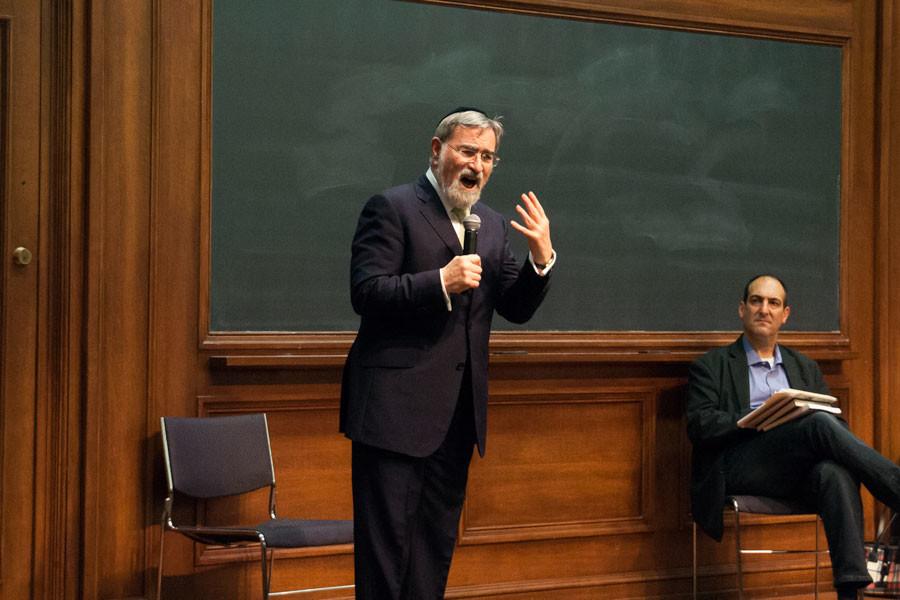On anniversary of Israeli PM’s assassination, rabbi calls for religious tolerance
Katherine Pach/The Daily Northwestern
Rabbi Jonathan Sacks addresses students at Harris Hall on Wednesday. Sacks discussed confronting religious violence through tolerance and said people can prevent violence by recognizing that those with different religious beliefs are not enemies.
November 4, 2015
Rabbi Jonathan Sacks, a religious leader, philosopher and author, spoke Wednesday in Harris Hall to a crowd of more than 200 about confronting modern religious violence.
Sacks, who is currently a professor at New York University and Yeshiva University, has had a long and distinguished career. While serving as the Chief Rabbi of the United Hebrew Congregations of the Commonwealth from 1991-2013, Sacks wrote more than 20 books on various religious topics.
On the 20th anniversary of Israeli Prime Minister Yitzhak Rabin’s assassination, Sacks promoted religious tolerance and said having faith includes recognizing other faiths.
“How is it throughout history, people have come to hate in the name of the God of love?” he asked. “To kill in the name of the God of love? To wage war in the name of the God of peace?”
Rabin was murdered by an Israeli extremist who opposed Rabin’s peace talks with Palestinians. Sacks related his death to the theory of dualism, the idea that the world has two powers at work in the universe: God and a figure of evil.
When bad things happen, dualists question who did these terrible things to them and blame different religious groups, Sacks explained. This leads to religious violence, as in Rabin’s case, he said.
“Dualism is quite possibly the most dangerous phenomenon known in the history of humans,” Sacks said. “We cannot attribute evil to some independent force in the universe.”
Wednesday was Sacks’ first time speaking at Northwestern since 2011, when he discussed his book, “The Dignity of Difference.”
NU Hillel Executive Director Michael Simon said Sacks’ 2011 event was a huge success, and he was thrilled to bring the rabbi back.
“We hosted him four years ago, and it was a pretty large audience of students and community members,” Simon said. “He has a message that resonates beyond a Jewish audience”.
Weinberg senior Romy Bareket said Sacks impacted him as a modern Jew on a college campus.
“His strength as a leader of the religious community at large, and especially in the Jewish community at large, has empowered me and others to be strong in our beliefs and feel confident when going about our daily lives,” he said.
Ultimately, Sacks concluded, human beings should not be divided into those who serve God and those who serve the enemy of God.
He said people can prevent violence by recognizing that those with different religious beliefs are not enemies.
“Good is found in everyone and bad is found in everyone, and the battle between dark and light, between good and bad, is the one we have to find in ourselves,” Sacks said. “When we defeat the bad within ourselves, we bring peace to the world.”
Email: [email protected]


